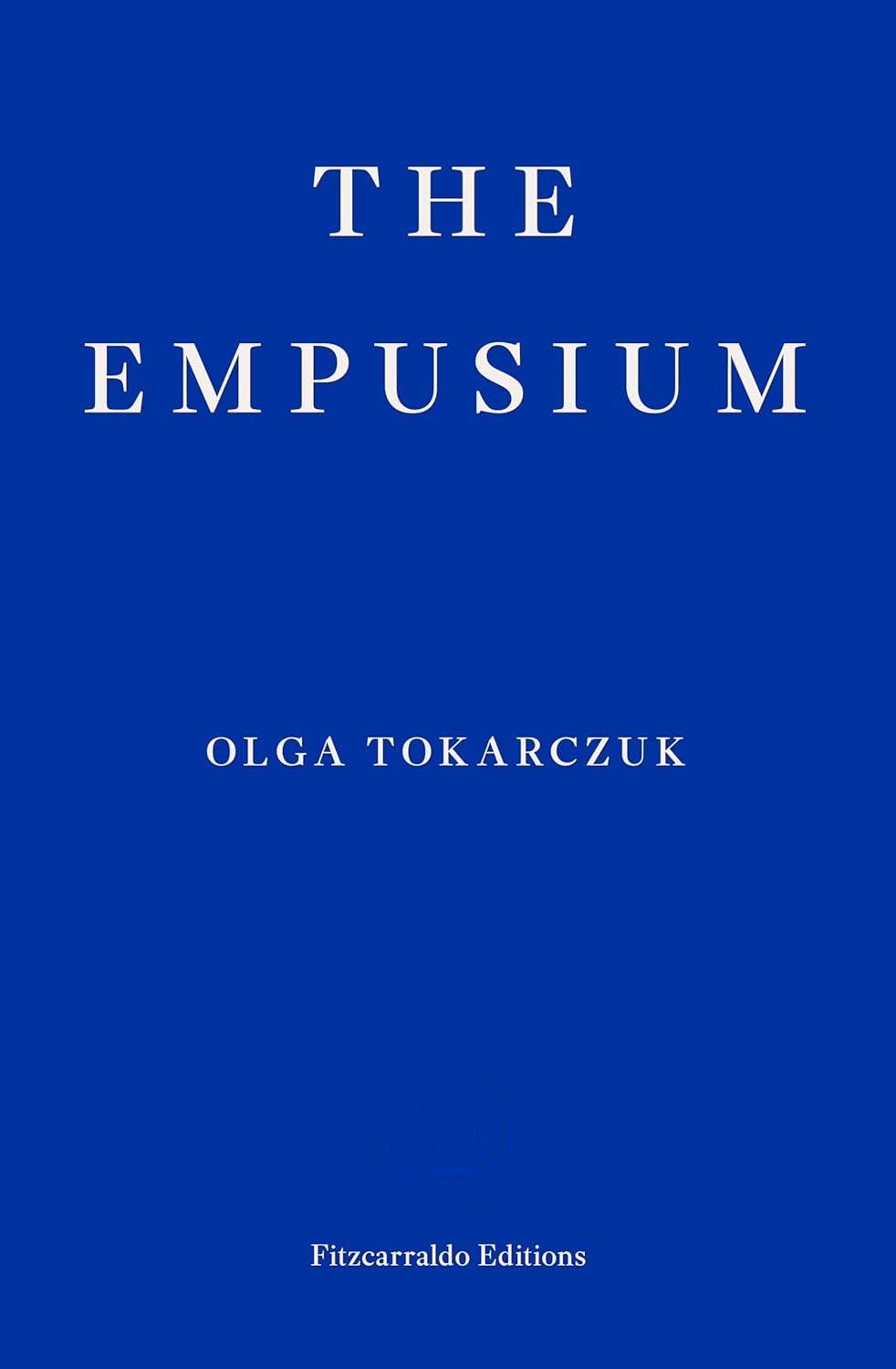The Empusium (Empuzjon)

Translated into English by Antonia Lloyd-Jones
In September 1913, a young Pole suffering from tuberculosis arrives at Wilhelm Opitz’s Guesthouse for Gentlemen, a health resort in the Silesian mountains. Every evening the residents gather to imbibe the hallucinogenic local liqueur and debate the great issues of the day: monarchy or democracy? Do devils exist? Are women born inferior? War or peace? Meanwhile, disturbing things are happening in the guesthouse and the surrounding hills. Someone – or something – seems to be watching, attempting to infiltrate this cloistered world. Little does the newcomer realize, as he tries to unravel both the truths within himself and the mystery of the sinister forces beyond, that they have already chosen their next target. A century after the publication of The Magic Mountain, Olga Tokarczuk revisits Thomas Mann territory and lays claim to it, blending horror story, comedy, folklore and feminist parable with brilliant storytelling.
“Tokarczuk’s fiction is built on filtering fragments of the past – people, stories, myths, orthodoxies – through a contemporary lens…. The Empusium is much less a debate of ideas than a study of our perception and the limits of sensory experience. Reality, or rather its elusiveness, preoccupies much of Tokarczuk’s work, which frequently blends genres as a way to get closer to, if not at, what’s true…. Grotesque sexism aside, there is spectacular humour to these scenes as the grandeur of their self-image is so elegantly undermined by the narrator’s description of them…. This too is a novel that in Tokarczuk’s dexterous hands transcends its own limits, further cementing the Nobel laureate as one of the most original storytellers of our age.”
— The Financial Times
“Despite the large (if mischievous) debt to The Magic Mountain, Tokarczuk makes this novel all her own with her idiosyncratic blend of registers and genres. She is both a collagist and a doodler, a freewheeling improvisator taking her narrative line for a gloriously erratic walk…. In Lloyd-Jones’s poised translation, Tokarczuk’s puckishness gleams brightly. The best passages in this new novel are weird, lyrical rhapsodies describing the natural world through the all-seeing eyes of those mysteriously plural narrators…. Happily, all the various unlikely strands come together in the closing chapters. The eerily majestic finale is haunting, cathartic and gleeful – a zany confection that could only have come from this unpredictable, unique writer.”
— The Times Literary Supplement
“Deft and disturbing…. In Antonia Lloyd-Jones’s crisp translation, Tokarczuk tells a folk horror story with a deceptively light and knowing tone … elegant and genuinely unsettling.”
— The New York Times
“The book challenges you to think while still being slyly funny … [and] there’s also a compelling plot to pull us along…. There are three plot-twisting surprises, one that I guessed early on, one I was wrong about and one that floored me. Tokarczuk is a writer of definite views, many of which I disagree with, but this is clever, intelligent stuff, touched with genius.”
— The Times
“The Nobel Prize-winning novelist is exceptionally adept at blending the high-minded sanctimoniousness of the sanatorium with the ever-present threat and legacy of violence…. Tokarczuk’s outstanding novel is a striking reaffirmation of literature’s genius for nuance in a world darkened by murderous polarities.”
— The Irish Times
“Appropriately enough for a book in which psychedelic mushrooms crowd the forest floors, waiting to become the main ingredient of the local liqueur that stands on every table, The Empusium is very much on its own trip. Its subtitle is A Health Resort Horror Story, and Tokarczuk makes entertaining use of familiar ingredients: mysterious crones, menacing yokels, strange behaviour at Mieczysław’s guesthouse, inexplicable noises from the attic, and the creeping realization that not everyone at the sanatorium is dying of their disease…. [It is] a novel filled with striking images – a toad atop a mound of potatoes, a headless duck, sperm-squirting parasites that burst from the stomachs of fish…. Speaking of Görbersdorf, Thilo tells Mieczysław that “one sinks into a strange state of mind here”. The same could be said of Tokarczuk’s novel, but as invitation rather than warning.”
— The Guardian
“The tension builds to a wild night of collective madness, a drunken witches’ sabbath. And death will come for someone. There’s an almost Borgesian quality to the resolution. But remember, this is Tokarczuk. Nothing is ever quite as it seems.”
— Lee Langley, Spectator
“It’s an odd, fascinating book – a blackly serious joke – from an author of great daring and intelligence…. The writing, in a cultivated translation by Antonia Lloyd-Jones, shares the easygoing gait and twinkling irony of Mann’s novel…. It makes for absorbing if often mystifying reading, but what stands out most is the philosophical conflict it stages between rationality and folk belief.”
— Sam Sacks, Wall Street Journal
“Mushrooms, trees, turf, twigs, bushes, moss-covered stones: nature is a force in The Empusium, incoherent and disorganized, yet also personified, sort of, in the collective voice that tells the story, that sees and knows it all. It sits there, in its Lower Silesian valley, in much the way that Janina Duszejko sits in hers in Drive Your Plow. Genres enclose these novels like rings of mountains, which is to say, they bring shelter and containment, though there are always gaps and passes. Part satire, part scrapbook, part picture-postcard tribute to a beloved piece of country, both these novels work really well. The old forms impose limits on Tokarczuk’s immense pansophic ambition, and from that tension emerges something new.”
— Jenny Turner, London Review of Books
“From mystery drinks and deaths to commentary upon religion and gender, this book is the literary horror story that eagerly awaits your autumn reading list…. A magnificently haunting portrayal of health, death, and all that comes in between, The Empusium is one of Tokarczuk’s best works to date.”
— Madeline Schultz, Chicago Review of Books
“The Nobel Laureate’s bloody and moody fairy tale will blow your mind…. Tokarczuk keeps the suspense at a low boil throughout, balancing moments of terror and revulsion…. Until the horror and the beauty can no longer be contained, that is, and erupt into the novel’s utterly sublime conclusion. As ever, Tokarczuk’s prose – and Antonia Lloyd-Jones’ glorious translation thereof from the Polish – will knock the wind out of you. ... The Empusium asks: If bigotry and violence make up the bedrock of our cultural traditions, can we still teach ourselves new ways of seeing and thinking? If we squint hard enough, can we find the women and other unpersons hidden in the past — and the present?”
— Chelsea Davis, San Francisco Chronicle
“Tokarczuk has a lot of fun with her novel’s pulpy gothic trappings, but … there’s also a much more serious reckoning going on with ideas of gender and twentieth century political thought. A gleefully mischievous feminist riposte to Thomas Mann’s The Magic Mountain.”
— Claire Allfree, Daily Mail
“Pulling from folktales, mythology, art, and literature, Tokarczuk’s novel spins a story that feels eerily familiar and yet totally new…. The Empusium is a masterful novel, with a breadth of possible readings. I won’t spoil the twists and turns of its deft story … but I will say that the novel defied my expectations, turning me into Wojnicz confronted with the de Bles landscape…. Just when you think you have this novel in your sight, it shimmers into something else entirely.”
— Bekah Waalkes, The Atlantic
“Tokarczuk’s latest work reckons with some of the major intellectual questions of the twentieth century while simultaneously spinning a mysterious – and spooky – web of intrigue and suspense. A crucial addition to Tokarczuk’s oeuvre.”
— Kirkus, STARRED review
“Slippery, interesting, and impish ... easy to follow, yet difficult to fathom ... cannily constructed and uncompromisingly surreal. ... By jauntily cleaving to Mann’s text while also inverting it, Tokarczuk has created a narrative in which the parable sits like a temperamental bolt of electricity in the historical orbit of the European novel.”
— The Nation
“A marvelous reframing of The Magic Mountain … [that] can be enjoyed — and may even be more enjoyable — on its own merits … Lloyd-Jones’s uniformly excellent translation of The Empusium is a much breezier read.”
— Boston Globe
“Tokarczuk masterfully maps out a new kind of horror story, one that weaves together elements of folklore and feminist allegory.”
— Harper’s Bazaar
“In Tokarczuk’s hands, the staid genre of the bildungsroman erupts with sinister possibility…. A grand fantasy of revenge … taut, febrile.”
— Washington Post
“Fiercely feminist … Tokarczuk’s erudite, subversive, and delightfully zany novel challenges us … to look hard at what’s being said and done around us, especially things we might prefer not to have to witness.”
— Book Forum
“This rich gothic novel set in 1913 is certainly haunted, but also rife with social commentary on gender dysphoria, inequality, and prejudice. Readers will come for the eerie atmosphere but stay for the searing critique of society’s tendency to discard its most vulnerable if it means maintaining a semblance of safety.”
— Booklist
“Olga Tokarczuk’s deft, dark satirical wit is on full display in The Empusium, which challenges the rigid patriarchal world of pre-WWI Europe with horror and humor.”
—BookPage
“The gothic elements keep the blood stirring.”
— Library Journal
“Tokarczuk concocts a potent blend of horror tropes and literary references (Franz Kafka, Thomas Mann) as she realizes the potential of her tale’s uncommon setting—a community set apart by the omnipresence of sickness and death, where the rules of civilized propriety give way to more fantastic possibilities. Readers will find much to savor.”
— Publishers Weekly
“Historical fiction threaded through with a playful kind of literary horror, The Empusium . . . is in part a wry response to Thomas Mann’s classic The Magic Mountain, blending high philosophy with dark comedy, strange folklore, and hallucinogenic liquors.”
— Goodreads, “Most Anticipated Books of the Fall”
"The Polish Nobel winner ladles up a deliciously creepy revenge tale in this satirical spin on Thomas Mann’s 100-year-old masterpiece The Magic Mountain. Instead of the Alps, we’re in the mountains of Silesia, among a group of male tuberculosis patients spouting misogynist tirades while off their faces on psychedelic liquor. But odd goings-on in the woods portend a comeuppance (...) This is close to the shivery slimline thrill of her surprise 2018 hit, Drive Your Plow Over the Bones of the Dead"
— The Guardian, “Most Anticipated Books of Autumn 2024”





